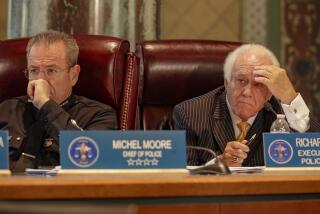Pistol Club Keeps Control of Public Gun Range
- Share via
LONG BEACH — The problem-plagued public pistol range will continue to be operated by the Police Pistol Club of Long Beach, but under new “stringent, businesslike guidelines” set in an agreement the city adopted this week.
The City Council on Tuesday did not follow a recommendation by the city auditor, who said the Police Department should take over the operation. The range--once managed by a police sergeant convicted of embezzling money, weapons and equipment--continues to have record-keeping and inventory problems, the auditor wrote in a recent report.
In response, police officials said they are working to strengthen record controls, but they have no intention of taking over the public range, as recommended by city Auditor Robert E. Fronke.
Instead of running the range, police recently finalized an agreement with the Police Pistol Club of Long Beach, which has operated the facility, to allow it to continue managing it, but adding “stringent, businesslike guidelines,” Deputy Police Chief David Dusenbury said.
The pistol range is owned by the city but operated by the pistol club, a nonprofit organization run by a 10-member board (nine members of which are police officers). The range, which is adjacent to the police-only range, is used by police from Long Beach and elsewhere as well as about 175 to 200 civilians, said Davy Caven, club president and a police sergeant. City Manager James C. Hankla said he supports the agreement reached between police and the pistol club and does not agree with the auditor that the city must take control over the range’s operation. With new, “very, very stringent controls,” Hankla said, “we’re certainly willing to give it a try” with the police club.
In his recommendations for the pistol range, Fronke suggested, among other things, establishing an ammunition inventory control and an official record of weapons that need repair.
Dusenbury said officials are working to establish the procedures Fronke recommends.
Those controls include new provisions that require quarterly and annual financial reports, the creation of a procedural manual for the facility’s operation and approval by the Police Department for any new hires, according to Dusenbury. Under the old agreement, there were no such financial requirements, no operation manual and the club did its own hiring, he said.
“The agreement that we have developed gives the city reasonable, adequate safeguards against any recurrence of the type (of problems) that involved Fred Smith or any other problems,” Dusenbury said.
Smith was the sergeant convicted on charges of grand theft and dismissed from the force when police learned in 1985 that he had been embezzling money and equipment beginning in August, 1981, Dusenbury said.
More to Read
Sign up for Essential California
The most important California stories and recommendations in your inbox every morning.
You may occasionally receive promotional content from the Los Angeles Times.













